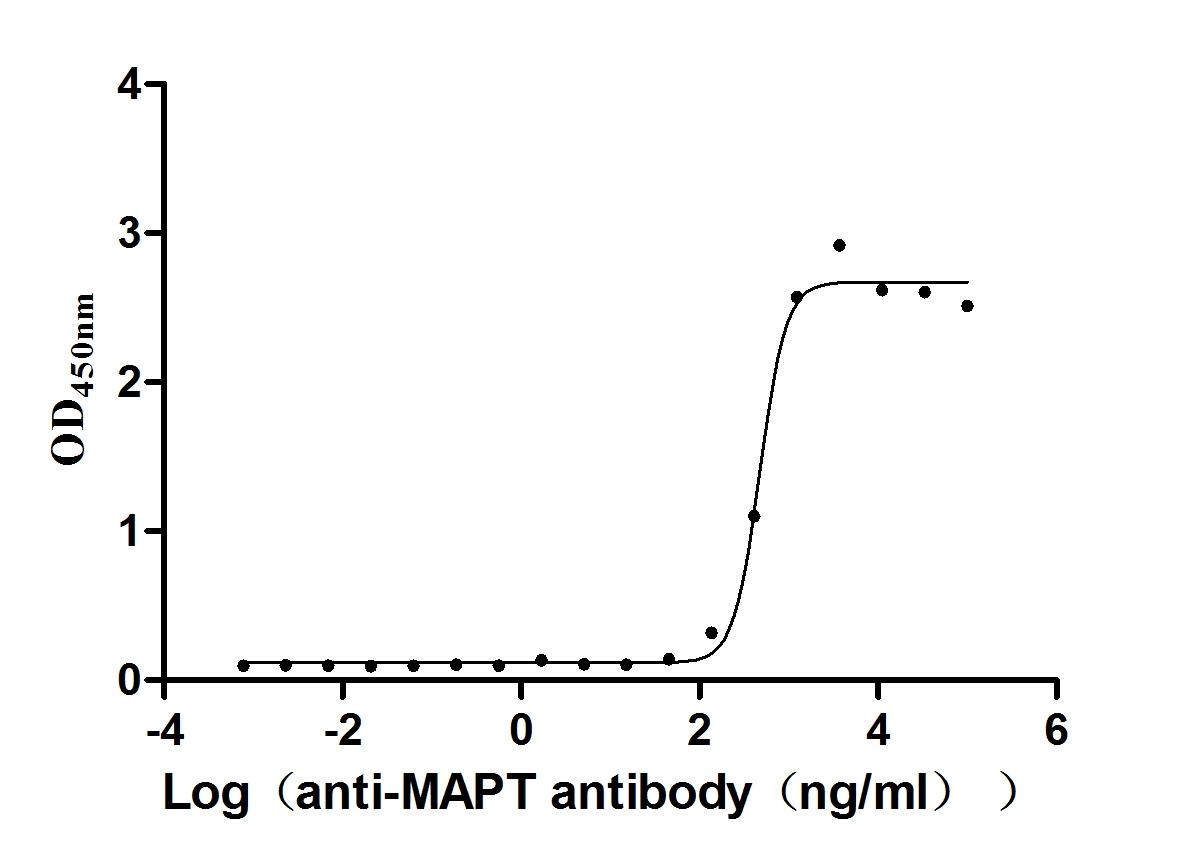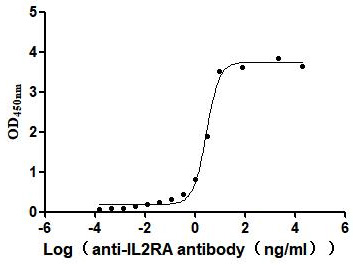Recombinant Human Protein chibby homolog 1 (CBY1)
-
中文名稱:Recombinant Human Protein chibby homolog 1(CBY1),Yeast
-
貨號(hào):CSB-YP896889HU
-
規(guī)格:
-
來(lái)源:Yeast
-
其他:
-
中文名稱:Recombinant Human Protein chibby homolog 1(CBY1),Yeast
-
貨號(hào):CSB-EP896889HU-B
-
規(guī)格:
-
來(lái)源:E.coli
-
共軛:Avi-tag Biotinylated
E. coli biotin ligase (BirA) is highly specific in covalently attaching biotin to the 15 amino acid AviTag peptide. This recombinant protein was biotinylated in vivo by AviTag-BirA technology, which method is BriA catalyzes amide linkage between the biotin and the specific lysine of the AviTag.
-
其他:
-
中文名稱:Recombinant Human Protein chibby homolog 1(CBY1),Yeast
-
貨號(hào):CSB-BP896889HU
-
規(guī)格:
-
來(lái)源:Baculovirus
-
其他:
-
中文名稱:Recombinant Human Protein chibby homolog 1(CBY1),Yeast
-
貨號(hào):CSB-MP896889HU
-
規(guī)格:
-
來(lái)源:Mammalian cell
-
其他:
產(chǎn)品詳情
-
純度:>85% (SDS-PAGE)
-
基因名:CBY1
-
Uniprot No.:
-
別名:ARPP-binding protein; C22orf2; CBY; Cby1; CBY1_HUMAN; Cytosolic leucine rich protein ; Cytosolic leucine-rich protein; Golgi and endoplasmic reticulum-associated 1; HRIHFB2025; PIGEA 14; PIGEA-14; PKD2 interactor; PKD2 interactor, Golgi and endoplasmic reticulum-associated 1; Protein Chibby; Protein chibby homolog 1
-
種屬:Homo sapiens (Human)
-
蛋白長(zhǎng)度:full length protein
-
表達(dá)區(qū)域:1-126
-
氨基酸序列MPFFGNTFSP KKTPPRKSAS LSNLHSLDRS TREVELGLEY GSPTMNLAGQ SLKFENGQWI AETGVSGGVD RREVQRLRRR NQQLEEENNL LRLKVDILLD MLSESTAESH LMEKELDELR ISRKRK
-
蛋白標(biāo)簽:Tag?type?will?be?determined?during?the?manufacturing?process.
The tag type will be determined during production process. If you have specified tag type, please tell us and we will develop the specified tag preferentially. -
產(chǎn)品提供形式:Lyophilized powder
Note: We will preferentially ship the format that we have in stock, however, if you have any special requirement for the format, please remark your requirement when placing the order, we will prepare according to your demand. -
復(fù)溶:We recommend that this vial be briefly centrifuged prior to opening to bring the contents to the bottom. Please reconstitute protein in deionized sterile water to a concentration of 0.1-1.0 mg/mL.We recommend to add 5-50% of glycerol (final concentration) and aliquot for long-term storage at -20℃/-80℃. Our default final concentration of glycerol is 50%. Customers could use it as reference.
-
儲(chǔ)存條件:Store at -20°C/-80°C upon receipt, aliquoting is necessary for mutiple use. Avoid repeated freeze-thaw cycles.
-
保質(zhì)期:The shelf life is related to many factors, storage state, buffer ingredients, storage temperature and the stability of the protein itself.
Generally, the shelf life of liquid form is 6 months at -20°C/-80°C. The shelf life of lyophilized form is 12 months at -20°C/-80°C. -
貨期:Delivery time may differ from different purchasing way or location, please kindly consult your local distributors for specific delivery time.Note: All of our proteins are default shipped with normal blue ice packs, if you request to ship with dry ice, please communicate with us in advance and extra fees will be charged.
-
注意事項(xiàng):Repeated freezing and thawing is not recommended. Store working aliquots at 4°C for up to one week.
-
Datasheet :Please contact us to get it.
相關(guān)產(chǎn)品
靶點(diǎn)詳情
-
功能:Inhibits the Wnt/Wingless pathway by binding to CTNNB1/beta-catenin and inhibiting beta-catenin-mediated transcriptional activation through competition with TCF/LEF transcription factors. Has also been shown to play a role in regulating the intracellular trafficking of polycystin-2/PKD2 and possibly of other intracellular proteins. Promotes adipocyte and cardiomyocyte differentiation.
-
基因功能參考文獻(xiàn):
- FAM92 proteins interact with Cby1 to promote ciliogenesis via regulation of membrane-remodeling processes. PMID: 27528616
- chronic Cby1 knockdown in colon cancer cells may counteract tumor progression by promoting the mesenchymal-to-epithelial transition process. PMID: 28107095
- Cby's C-terminal domain alone binds to TC-1 with significantly greater affinity compared to full-length Cby, implying that target binding of the coiled-coil domain is affected by the flanking disordered regions. PMID: 27082063
- CBY1 downregulation in CML comes from reduced protein stability when bound to 14-3-3sigma adapter protein. Dissociation raises CBY1 protein levels by enhancing its stability. The ubiquitin proteasome system reduces 14-3-3sigma-bound CBY1 stability by SUMOylation. PMID: 26147002
- Study showed that expression of Cby protein was strongly downregulated in laryngeal squamous cell carcinoma (LSCC) tumor tissues in comparison to normal laryngeal mucosa samples. PMID: 25175341
- the impact of BCR-ABL1 on Chibby1, a beta catenin antagonist involved in cell differentiation and transformation PMID: 24339928
- Stable expression of CBY1 drives beta catenin cytoplasmatic translocation and impairs beta catenin signaling in BCR-ABL + cells. PMID: 23707389
- Results from the association analysis suggest that common variation in CBY is not a cause for obesity in the Belgian population. PMID: 23645032
- C-terminal polycystin-2 influences the interaction with PIGEA14 PMID: 23838289
- Cby plays an important role in organization of both primary and motile cilia in collaboration with Cnx. PMID: 22911743
- The N-terminal portion of the CBY1 is unstructured in solution, but the C-terminal half forms a coiled-coil structure. PMID: 21182262
- Chibby and clusterin were co-immunoprecipitated with NBPF1. PMID: 20096688
- These findings unravel the molecular basis through which a combinatorial action of Cby and 14-3-3 proteins controls the dynamic nuclear-cytoplasmic trafficking of beta-catenin. PMID: 19940019
- Chibby inhibits beta-catenin-mediated transcriptional activation by competing with Lef-1 to bind to beta-catenin PMID: 12712206
- PIGEA-14 plays an important role in regulating the intracellular location of polycystin-2 PMID: 15194699
- As no somatic mutation was detected in C22orf2 in 36 colorectal tumour DNA, our results do not support the implication of Chibby as a tumour suppressor in colorectal carcinogenesis. PMID: 15245581
- Chibby is not likely to promote colorectal carcinoma tumor development or progression. PMID: 16570344
- CBY promotes adipocyte differentiation through inhibition of beta catenin signaling. PMID: 17403895
- intrinsically disordered TC-1 interacts with Cby via its transient helical structure PMID: 17905836
- 14-3-3epsilon and 14-3-3zeta are identified as Cby-binding partners. PMID: 18573912
- genes including CHIBBY involved in pediatric ependymomas. PMID: 18663750
- Alanine substitutions of two or more of four critical leucine residues within the C-terminal heptad repeats eliminate the Cby-Cby interaction. PMID: 19435523
顯示更多
收起更多
-
亞細(xì)胞定位:Nucleus speckle. Cytoplasm, cytoskeleton, cilium basal body. Cytoplasm, cytoskeleton, microtubule organizing center, centrosome, centriole. Golgi apparatus. Golgi apparatus, trans-Golgi network.
-
蛋白家族:Chibby family
-
組織特異性:Widely expressed. Expressed at higher levels in heart, skeletal muscle, kidney and placenta. Also found in brain, lung, liver and testis. Significantly down-regulated in thyroid and metastatic uterine tumors.
-
數(shù)據(jù)庫(kù)鏈接:
Most popular with customers
-
Recombinant Human Tumor necrosis factor ligand superfamily member 14 (TNFSF14), partial (Active)
Express system: Mammalian cell
Species: Homo sapiens (Human)
-
Recombinant Mouse Microtubule-associated protein tau (Mapt) (Active)
Express system: Mammalian cell
Species: Mus musculus (Mouse)
-
Recombinant Macaca mulatta Semaphorin-4D isoform 1 (SEMA4D), partial (Active)
Express system: Mammalian cell
Species: Macaca mulatta (Rhesus macaque)
-
Recombinant Human Claudin-6 (CLDN6)-VLPs (Active)
Express system: Mammalian cell
Species: Homo sapiens (Human)
-
Recombinant Human Claudin-4 (CLDN4)-VLPs (Active)
Express system: Mammalian cell
Species: Homo sapiens (Human)
-
Recombinant Macaca fascicularis CD93 molecule (CD93), partial (Active)
Express system: Mammalian cell
Species: Macaca fascicularis (Crab-eating macaque) (Cynomolgus monkey)
-
Recombinant Human Claudin-6 (CLDN6)-VLPs, Fluorescent (Active)
Express system: Mammalian cell
Species: Homo sapiens (Human)
-
Recombinant Human Interleukin-2 receptor subunit alpha (IL2RA), partial (Active)
Express system: Mammalian cell
Species: Homo sapiens (Human)





-AC1.jpg)


f4-AC1.jpg)









